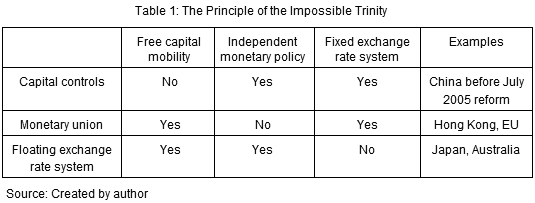Columbia University Professor Robert Mundell (born in 1932), the winner of the 1999 Nobel Prize in Economics who is also known as the intellectual father of the euro, is touted in China as the foremost authority on international monetary affairs and his advice has been sought on the reform of the yuan exchange rate regime. Over recent years, Professor Mundell has consistently opposed a revaluation of the Chinese currency, insisting that China should keep the yuan pegged to the U.S. dollar. However, this idea is not consistent with what would be derived from his earlier, highly regarded theories, namely his analysis of "monetary and fiscal policy under different exchange rate regimes" (economic policy mix and the Mundell-Fleming model) and his works on "optimum currency areas" in the 1960s for which he was awarded the Nobel Prize. Which of him - Mundell as Nobel laureate (post-Nobel Mundell) or Mundell as young economist (pre-Nobel Mundell) - is correct on the issue of the yuan exchange rate regime?
Assignment of economic policy instruments
Where multiple goals must be pursued, it is necessary to consider a policy mix based on Tinbergen's rule that achieving a multiple number of independent policy targets requires an equal number of policy instruments, as well as on Mundell's rule that each policy instrument should be assigned to the policy target on which it has the greatest relative effect.
In contrast, as to why he opposes a revaluation of the yuan, in recent years Professor Mundell has pointed to a host of maladies that may result from such a move. These include: 1) a reduction in investments from overseas, 2) a slowdown of the Chinese economy, 3) an increase in nonperforming loans held by banks, 4) a decrease in the profitability of Chinese enterprises, 5) a delay in the realization of the yuan's convertibility, and 6) a rise in deflationary pressure in rural agricultural areas. He has also said that the rise of the yuan could 7) become a destabilizing factor in the Southeast Asian region, 8) affect the yuan's status in areas outside China, and 9) provide a perfect opportunity for speculators. Yet according to Mundell's own rule, a country's foreign exchange policy should be assigned to correcting external account imbalances and other problems must be solved by other policy instruments, such as institutional reform.
Ineffectiveness of monetary policy under a fixed exchange rate regime
The Mundell-Fleming model, developed by Professor Mundell, demonstrates that the effectiveness of monetary and fiscal policies differs depending on the type of exchange rate regime and the degree of capital controls. For instance, in a country where capital movements are free and exchange rates are fixed, the monetary authorities cannot pursue an independent monetary policy. In a country with a fixed exchange rate regime harboring no exchange rate risk, domestic interest rates move in close tandem with foreign interest rates, those on assets denominated in the currency to which the country's currency is pegged, because of the functioning of interest rate arbitrage. Under this situation, the monetary authorities are unable to determine money supply on their own, just as they lose control over interest rates, because any attempt to adjust the money supply would be countered by the offsetting inflow or outflow of capital to or from the country.
The Mundell-Fleming model has been subsequently expanded into the principle of the "impossible trinity," that is, no country can simultaneously achieve the three goals of free capital mobility, independent monetary policy, and a fixed exchange rate system (table 1). China has hitherto pursued independent monetary policy while maintaining a fixed exchange rate system that is virtually a dollar-peg, by restricting capital movements, i.e. giving up free capital mobility. Following its accession to the World Trade Organization, capital mobility has increased and China is now being forced to shift to a floating exchange rate system in order to maintain an independent monetary policy, but Professor Mundell has continued to insist that China should keep its fixed exchange rate regime.

"The theory of optimum currency areas"
Just for argument's sake, let's say a fixed exchange rate system is more desirable for China than a floating one. Still, the question remains as to whether the dollar is the right choice of a currency peg. Under the dollar-peg system, China would, in effect, become part of the dollar area whereby Chinese interest rates would be subject to change in accordance with U.S. interest rates. Based on Professor Mundell's "Theory of Optimum Currency Areas" and subsequent extensions of this theory, if there were a high degree of synchronization between the business cycles in China and the U.S., the Chinese monetary authorities would be taking a stance very much similar to that of their U.S. counterparts. Therefore, China would have no serious problem even if it were to leave its monetary policy to the U.S. Federal Reserve Board. In reality, however, the two countries are exposed to "asymmetric shocks" and therefore the correlation in terms of Chinese and the U.S. economic growth rates is extremely low.
Thus China and the U.S. do not fulfill the conditions for an optimum currency area. Insofar as such is the case, pegging the yuan to the dollar will more likely lead to destabilization - rather than stabilization - of the Chinese economy. In fact, in order to keep the yuan's stability vis-a-vis the dollar against market forces, the Chinese monetary authorities are being forced to undertake massive interventions in the foreign exchange market and the resulting excess liquidity is contributing to the expansion of an asset bubble. China must reexamine its foreign exchange policy based on the current state of the Chinese economy by properly understanding Professor Mundell's theories instead of blindly following his advice.


